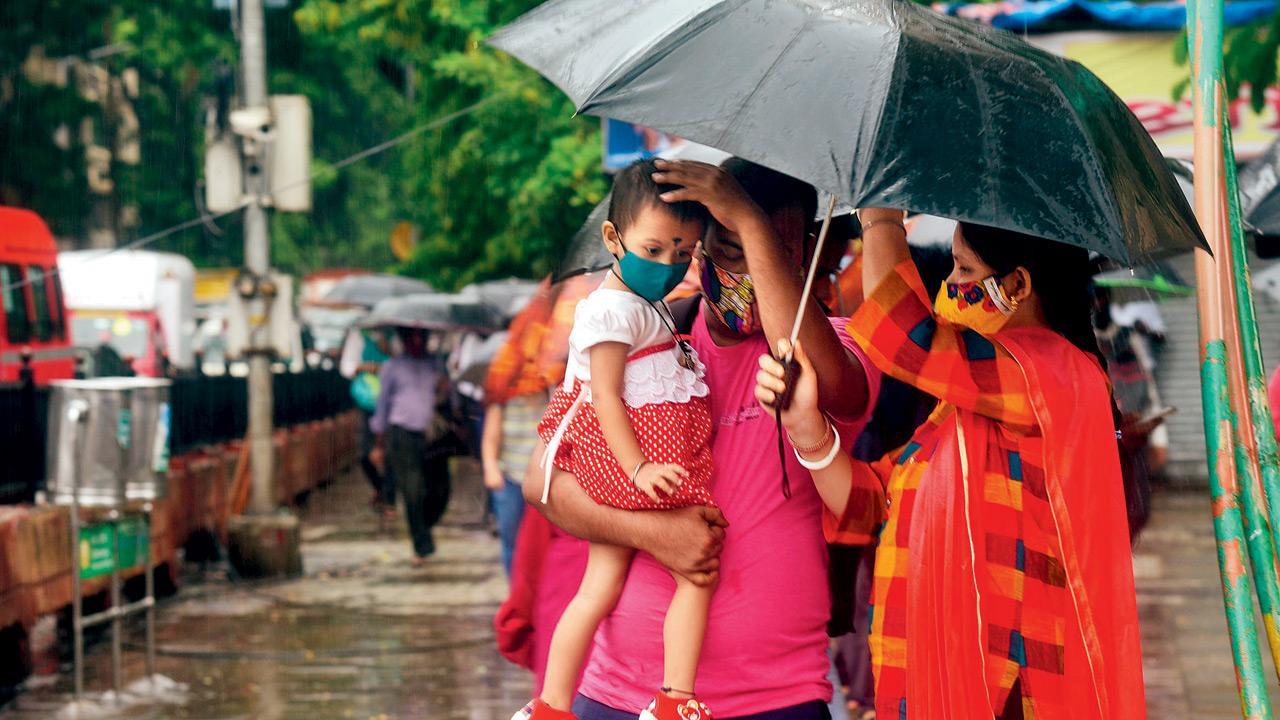Experts say infections such as malaria, leptospirosis, dengue and viral infections have overlapping symptoms

Parents shield their daughter amid a rainy day in Mumbai. Pic/Atul Kamble
Even if Covid-19 cases are declining in the city, doctors warn against a spurt in monsoon-related ailments, including dengue and influenza.
ADVERTISEMENT
In the last few weeks, Mumbai doctors have observed an increase in dengue cases—a viral disease that spreads via mosquitoes.
Dr Mala Kaneria, infectious diseases consultant, Jaslok Hospital, says, “Dengue cases typically rise in the months of September and October. But we are already seeing increasing cases of fever. Many unrelenting fevers recently are being looked into for Covid-19, but are eventually diagnosed as dengue.”
Dr Kaneria said that all monsoon-related infections such as malaria, leptospirosis, dengue and viral infections have overlapping symptoms, and are many times labelled as acute febrile illnesses (AFIs) or undifferentiated fevers in the presence of inconclusive reports.
“Monsoon-induced ailments can cause respiratory symptoms and complications, including Acute Respiratory Distress Syndrome (ARDS). Since we are in the midst of the Covid-19 pandemic, both patients and doctors are particularly alert about respiratory symptoms like cold, cough and dropping oxygen levels,” she added.
Dr Kaneria explained that the four serotypes of dengue, which are further divided into lineages and clades, can only be diagnosed accurately by genotyping, which is not performed routinely. “Over the last couple of years, it has been observed that several serotypes co-circulate and cause co-infections, causing severe manifestations in dengue,” she added.
Dr Vikrant Shah, consulting physician, intensivist, and infectious disease specialist, Zen Multispeciality Hospital Chembur, said, “Currently, we are seeing an increase in cases of dengue and malaria. If the fever associated with chills, headache and myalgia does not subside within two-three days, the patient should consult a doctor.”
Dr Sharat Kolke, physician, Kohinoor Hospital, confirmed that there is a spike in cases of malaria, leptospirosis and jaundice in the city. “These diseases have similar symptoms like fever, diarrhoea, vomiting, headache and joint pain due to a sudden change in weather. Preventing co-infection will allow segregating and treating Covid-19 patients accurately while reducing chances of wrong treatment that can lead to higher morbidity or mortality rates,” he added.
Doctors said that mosquito-breeding spots must be identified and removed. “Make sure that there is a system in place for water to flow and that it is not stagnated. Wear full-sleeved clothes and use mosquito repellent and nets to avoid mosquito bites. Fogging is recommended,” said Dr Kolke.
 Subscribe today by clicking the link and stay updated with the latest news!" Click here!
Subscribe today by clicking the link and stay updated with the latest news!" Click here!






